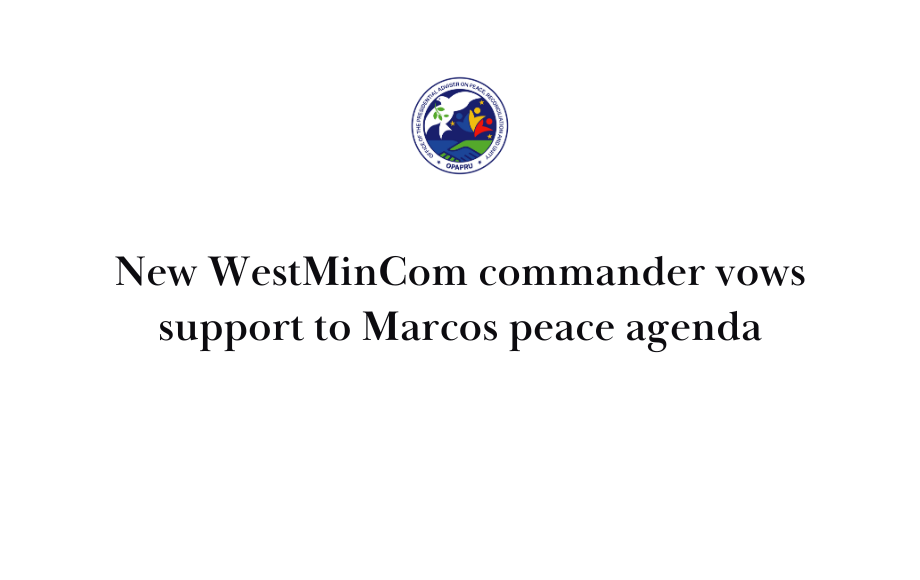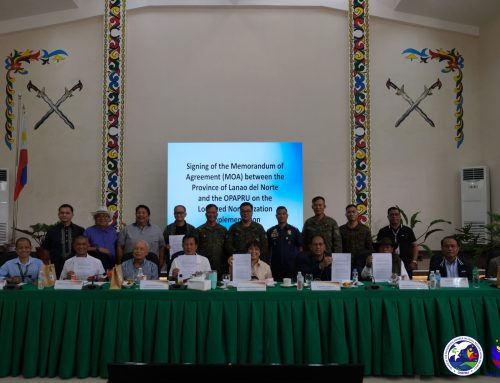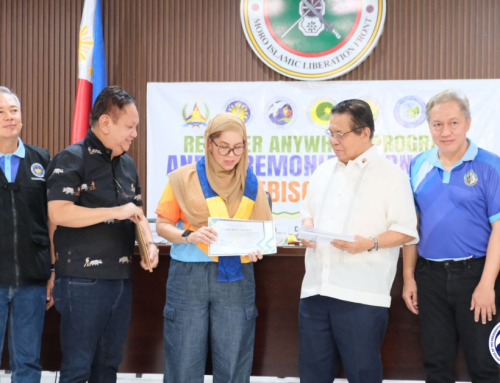ZAMBOANGA CITY – LtGen. William N. Gonzales, the newly-installed commander of the Western Mindanao Command (WestMinCom), has vowed to help push forward the Marcos administration’s comprehensive peace agenda, saying this will be the key in addressing internal armed conflict and external threats.
“Genuine and long-lasting peace cannot be achieved through armed force but through mutual understanding and dialogue,” emphasized Gonzales in his remarks on Friday, November 3, during the WestMinCom’s change of command ceremony presided by AFP Chief-of-Staff Gen. Romeo S. Brawner here in Camp Don Baslio Navarro, this city.
Gonzales replaced MGen. Steve D. Crespillo as WestMinCom commander.
The WestMinCom is the AFP’s unified command in charge of the Zamboanga Peninsula, part of Northern Mindanao, Region 12 and the Bangsamoro Autonomous Region in Muslim Mindanao (BARMM). It is tasked to defend these areas against external aggression, as well as combat terrorism and insurgency.
Securing peace through reconciliation
According to Gonzales, the WestMinCom shall continue to work closely with the Office of the Presidential Adviser on Peace, Reconciliation and Unity (OPAPRU) “in the implementation of the comprehensive peace process through fostering reconciliation, as we pursue a proactive and innovative way of strengthening our internal security by reducing the proliferation of illegal weapons, ammunitions and explosives.”
“We will support the Normalization process in the BARMM to pave the way in laying down of firearms, facilitating their transition to peaceful life and pursuing sustainable livelihood,” he said.
“Moreover, we will remain committed in upholding existing ceasefire agreements, but shall be ready to respond and undertake accurate and precise operations against these peace spoilers,” Gonzales added.
The WestMinCom chief said the command shall also support the implementation of the national government’s PAyapa at MAsaganang PamayaNAn (PAMANA) Program and Enhanced-Comprehensive Local Integration Program (E-CLIP) in conflict-affected areas, as well as push for the implementation of the Amnesty Program for former rebels “to significantly decrease the number of threat groups and dissuade them from continuing their dissident acts.”
“Moreover, we shall participate in collaborative engagements with our stakeholders through the multi-level convergence operations at all levels to inspire synergism with one another to make communities resilient against radicalization, violent extremism and terrorism, and ultimately, dismantle the threat group support system,” Gonzales said.
For his part, Brawner lauded the WestMinCom and the rest of the AFP for ensuring the safety and security of Filipinos during the recent Barangay and Sangguniang Kabataan Elections (BSKE), saying they did a “very good job.”
AFP chief: ‘UNITY’ is the key
He noted that there was “no incident of failure of elections” in any part of the country, as military commanders “held the [security situation] with flying colors” despite reported incidents of violence in some parts of the country.
According to Brawner, the country is “experiencing relative peace” because of the relentless peacekeeping efforts of the AFP, which is anchored on the principle of “UNITY.”
He explained that “U” in unity stands for “Unification” within the AFP, which is transforming it into a highly-professional organization.
Brawner said “N” stands for the “Normalization” Program for revolutionary groups in the Bangsamoro and for other former rebels, as he stressed the need to observe the timely implementation of peacebuilding interventions in the region.
“I,” he said, stands for “ISO” or Internal Security Operations, which must be focused on neutralizing the threats posed by the communist terrorist group.
Brawner said “T” stands for “Territorial Integrity,” which requires protecting the country’s borders, particularly with Malaysia and Indonesia that are within the WestMinCom’s area of coverage, and especially the West Philippine Sea. This also involves beefing up the nation’s cyber security capabilities.
And lastly, he said “Y” stands for “Youth” which entails strengthening the nation’s reserve force through Reserve Officers’ Training Corps. He said the military will also actively recruit reservists in the BARMM as part of its initiatives to counter the recruitment efforts of extremist groups.
“We possess the resilience and courage to persevere,” Brawner said, as he called on the Filipino people to continue supporting the AFP in its peacekeeping and peacebuilding work.
Peace adviser: BSKE, a ‘litmus test of a well-functioning democracy in the BARMM
Meanwhile, Presidential Adviser on Peace, Reconciliation and Unity Sec. Carlito G. Galvez, Jr. commended the AFP and Philippine National Police for helping the COMELEC in ensuring safe, orderly and peaceful elections throughout the country.
“I commend and thank the men and women of the AFP and PNP for the remarkable job you have done, particularly in ensuring the security of our countrymen as they cast their votes. You ensured the sanctity of the ballot, and we are most grateful for what you have done,” Galvez said.
“Despite the occurrence of incidents in some parts of the country, the national government and the security sector can say that it did everything possible to protect our people from these peace spoilers,” he added.
Like Brawner, Galvez also highlighted that there was no report of a failure of elections, even a single one, which is “a testament that the right of suffrage of Filipinos was protected across the nation.”
“As we all know, threats to democracy, rule of law and human rights still persist, especially during elections. We, as peace-loving Filipinos, therefore, must do everything in our capacity to fight for these values and principles,” he stressed.
Galvez pointed out that it was the first time that the BSKE was held in the BARMM, which he described as “a litmus test of a well-functioning democracy” and “a testament of genuine moral governance.”
“We must remember that the BARMM was just established four years ago, making it a newcomer, so to speak, in the affairs of governance,” he said, adding, “which makes the conduct of the recent elections in the region both inspiring and admirable.”
“The BARMM leadership knows exactly the challenges it is facing, especially in the socio-economic and socio-political sphere. But despite these difficulties, it still forged ahead, confident in its capacity to hold free and honest elections,” Galvez said.
The peace adviser assured the BARMM government that the Marcos Administration remains steadfast in its commitment to help strengthen and enhance the main pillars of governance in the Bangsamoro.
“With the first BARMM regional elections just less than two years away, the BARMM government is demonstrating that it is more than capable of handling the reins of governance. And the national government will be here to support its efforts to create a better, brighter and more progressive future for our Bangsamoro brothers and sisters,” Galvez said. ###












